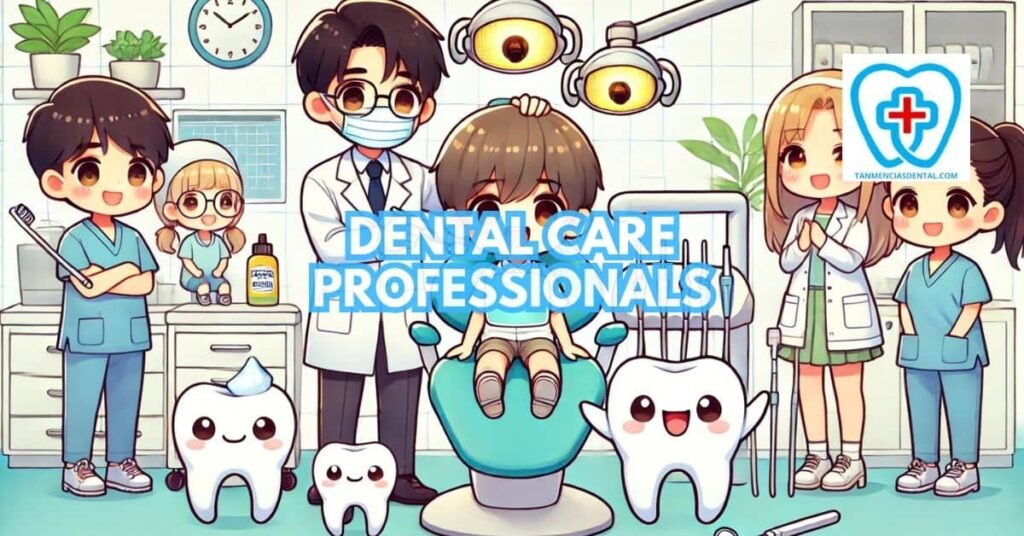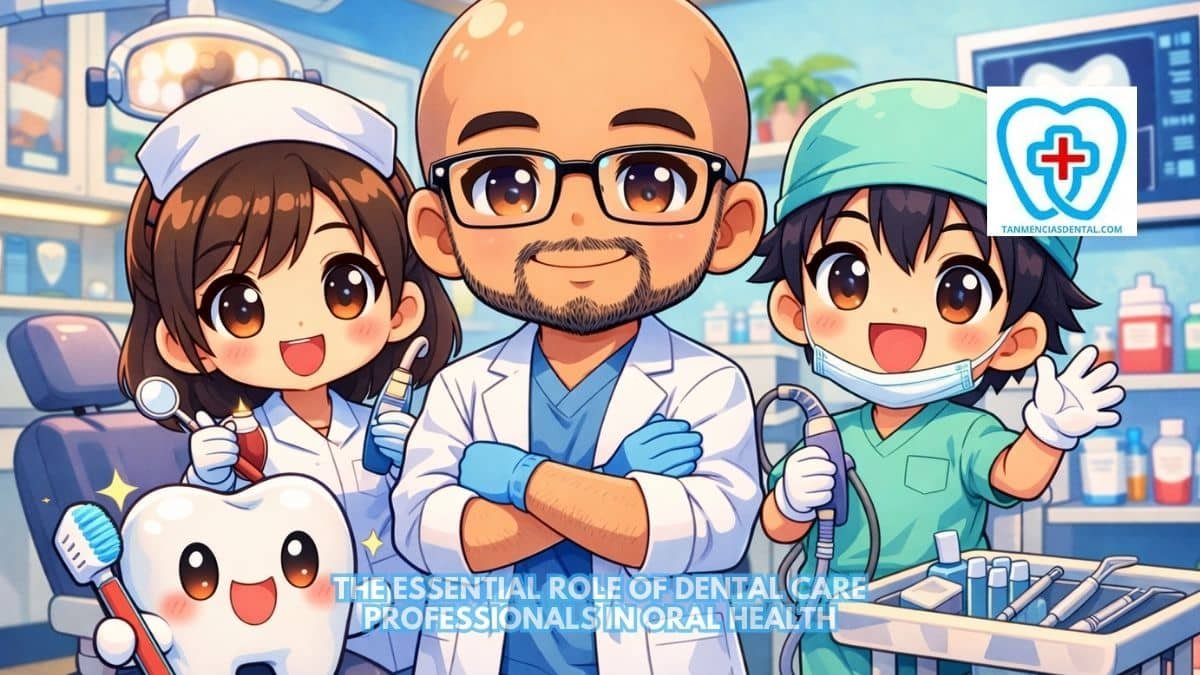Good oral health requires more than brushing and flossing at home.
Dental care professionals play a vital role in preventing problems, finding issues early, and providing the right treatment at the right time.
When we understand how they support our care, we can make better choices for our teeth and gums.
We’ll explain how the dental team works together to deliver safe and complete care for patients of all ages.
Along the way, we’ll cover prevention, early detection, personalized treatment, modern technology, and community support.
By learning how dental care professionals protect both oral and overall health, we can take a more active role in maintaining a healthy smile for life.
1. Understanding the Dental Team and Their Unique Roles
Dental care is not provided by one person alone, but by a team of trained professionals who work together to support patients.
Dentists lead the team by examining patients, diagnosing problems, and creating treatment plans that guide care from start to finish.
When a patient is missing a tooth, the dentist may recommend options such as bridges, dentures, or dental implants to restore function and appearance.
Dental hygienists focus on preventive services such as cleanings, checking gum health, and teaching patients how to care for their teeth at home to avoid future problems.
Dental assistants prepare treatment rooms, pass instruments during procedures, and follow strict infection control steps to keep patients safe.
Some patients may also visit specialists, such as oral surgeons who place dental implants or orthodontists who correct bite alignment.
Behind the scenes, dental lab technicians create custom crowns, dentures, and implant restorations based on the dentist’s instructions.
When each team member fulfills their role carefully, patients receive organized and reliable care that supports long-term oral health.
🦷 Meeting Your Basic Dental Needs: Tips for Optimal Oral Health
2. The Importance of Preventive Dental Care
Preventive care is one of the most important parts of maintaining healthy teeth and gums.
In general dentistry, routine cleanings and exams form the foundation of long-term oral health.
During these visits, dental care professionals remove plaque and tartar, check for early signs of decay, and evaluate gum health.
They also provide clear advice on brushing, flossing, and other daily habits that help prevent problems at home.
By finding small issues early, they can treat them before they require fillings, root canals, or extractions.
This steady approach reduces discomfort, lowers treatment costs, and helps patients keep their natural teeth for many years.
🦷 Can Regular Oral Prophylaxis Sessions Actually Reverse Gingivitis?
3. How Dental Professionals Help with Early Detection of Problems
Dental professionals are trained to spot issues that may not be immediately visible to patients.
Through regular exams, they can identify problems like cavities, gum disease, or even early signs of oral cancer before symptoms become severe.
Advanced tools, such as digital X-rays, help them detect issues beneath the surface that would otherwise go unnoticed.
Early detection allows for timely treatment, which can prevent more complex and costly procedures later on.
This proactive care helps patients maintain a healthier mouth and reduces the risk of complications.
🦷 Everything You Need to Know About a Broken Tooth Repair Kit
4. Educating Patients on Effective Oral Hygiene Practices
An essential part of a dental professional’s role is teaching patients how to care for their teeth and gums effectively.
They provide personalized advice on brushing techniques, flossing, and the use of dental products tailored to each patient’s needs.
Dental professionals also emphasize the importance of nutrition and lifestyle habits that affect oral health.
By educating patients on these practices, they enable them to prevent common issues like tooth decay and gum disease.
Patient education is key to helping individuals take responsibility for their daily oral hygiene and maintain long-term health.
🦷 Can Saltwater Rinse Heal Gum Infection? What You Need to Know Before Trying It

5. Creating Customized Treatment Plans for Individual Needs
Dental care professionals understand that each patient’s oral health needs are different and may change over time.
After a careful exam, they review findings such as tooth decay, gum health, bite alignment, and past dental work before suggesting treatment options.
A personalized plan may include preventive care, restorative procedures, orthodontics, or cosmetic dentistry, depending on the patient’s goals and condition.
They also consider age, medical history, daily habits, and budget when deciding which treatments should come first.
By clearly explaining each option, they help patients make informed choices about improving function, appearance, or comfort.
This thoughtful planning process ensures that care is practical, realistic, and suited to each person’s specific situation.
🦷 How Poor Oral Hygiene Leads to Serious Diseases Caused By Not Brushing Your Teeth
6. Diagnosing and Managing Common Dental Conditions
Dental professionals are trained to identify and treat many types of oral health problems, including cavities, gum disease, and temporomandibular joint disorders.
After a careful exam, they explain the cause of the problem and outline clear treatment options.
In many cases, treatment may involve fillings, deep cleanings, or other procedures that stop the condition from getting worse.
When a problem is severe, surgery may be necessary to remove infection, repair damaged tissue, or restore oral function.
For chronic issues such as periodontitis, they provide regular monitoring and ongoing care to control the disease.
Through timely diagnosis and proper treatment, dental professionals help protect long-term oral health and improve daily comfort.
🦷 Can Bad Teeth Kill You? The Surprising Link Between Oral Health and Life-Threatening Diseases
7. Leveraging Technology for Improved Dental Services
Advancements in dental technology have significantly improved the quality and efficiency of care.
Dental care professionals now use digital X-rays, 3D imaging, and laser treatments to provide more precise diagnoses and less invasive procedures.
Technologies such as CAD/CAM systems allow for same-day crowns, reducing the number of visits required for restorative work.
These tools also enhance patient comfort, minimizing the discomfort associated with traditional dental treatments.
By incorporating the latest innovations, dental professionals can offer faster, more accurate, and more comfortable care to their patients.
🦷 Is It Normal To Experience Temporary Tooth Sensitivity After A Cleaning?
8. Collaborating with Healthcare Providers for Holistic Health
Oral health is closely linked to overall health, so dental care professionals often work closely with a medical doctor to support complete patient care.
For example, if a patient has diabetes, the dentist may speak with the doctor to better understand how blood sugar levels could affect gum health.
They may also coordinate care for patients with heart disease to lower the risk of infection before certain dental procedures.
By sharing health records and treatment plans, both providers can make informed decisions that protect the patient’s safety.
This teamwork helps ensure that dental treatments do not interfere with medical conditions or prescribed medications.
When dental professionals and a doctor communicate clearly, patients receive more balanced and effective care that supports their total well-being.
🦷 Can You Drink Tea After Brushing Your Teeth?
9. Techniques to Alleviate Patient Anxiety at the Dentist
Many people experience anxiety when visiting the dentist, and dental care professionals use various techniques to help patients feel more comfortable.
They offer calming environments, explain procedures clearly, and provide options like sedation or pain management for those with severe anxiety.
Additionally, they build trust by listening to patient concerns and addressing fears in a compassionate manner.
Some practices even incorporate mindfulness techniques or distractions, such as music or entertainment, to ease discomfort during procedures.
By prioritizing patient comfort, dental professionals help ensure that anxiety does not prevent people from seeking essential dental care.
🦷 Will Undergoing Oral Prophylaxis Finally Help Eliminate My Bad Breath?
10. Community Outreach: Promoting Oral Health Awareness
Dental care professionals often participate in community outreach efforts to raise awareness about the importance of oral health.
Through programs like free dental clinics, school visits, and public health campaigns, they provide essential education and services to underserved populations.
These outreach efforts teach individuals about preventive care, proper hygiene, and how to access dental services.
By reaching out to communities that may have limited access to care, dental professionals help reduce the incidence of preventable dental diseases.
Community involvement also promotes healthier habits across broader populations, improving overall public health.
🦷 Basic Dental Needs in Marikina
11. The Lifelong Benefits of Regular Dental Care
Consistent dental care throughout life leads to strong and lasting oral health.
Attending each scheduled dental appointment allows professionals to check for early signs of decay, gum problems, or other changes that may not cause pain yet.
During these visits, cleanings remove plaque and tartar that daily brushing and flossing cannot fully eliminate.
As patients grow older, dental care professionals adjust treatment plans to match changes in teeth, gums, and overall health.
Keeping every appointment also helps build a clear record of oral health, which makes it easier to spot patterns or new concerns over time.
With steady care and regular monitoring, people can protect both their smile and their overall well-being for many years.
🦷 High-Quality Dentistry in Marikina
👨⚕️ Conclusion
Dental care professionals play a crucial role in maintaining lasting oral health by providing preventive care, early detection, and tailored treatments.
Their expertise and use of advanced technology allow for a high standard of care that benefits patients of all ages.
Consistent engagement with these professionals, paired with proper oral hygiene at home, helps individuals avoid serious dental problems and promotes overall well-being.
Through education, community outreach, and collaboration with other healthcare providers, dental professionals ensure that oral health remains a key part of comprehensive health care.
Investing in regular dental care leads to a healthier, more confident future.
❔ FAQs
1. How often should I visit dental care professionals?
Most people should visit dental care professionals every six months for checkups and cleanings.
However, some patients may need more frequent visits if they have gum disease or other ongoing problems.
Regular visits help detect issues early before they become serious.
Your dental team can recommend a schedule based on your specific needs.
2. Why is preventive dental care so important?
Preventive care helps stop problems before they start.
Regular cleanings remove plaque and tartar that brushing alone cannot fully remove.
Early exams allow dental professionals to find small issues before they turn into painful or costly conditions.
This approach protects both your oral health and your overall well-being.
3. What is the difference between a dentist and a dental hygienist?
A dentist examines your mouth, diagnoses problems, and creates treatment plans.
A dental hygienist focuses on preventive care, such as cleanings and gum health checks.
Hygienists also teach proper brushing and flossing techniques.
Both work together to keep your teeth and gums healthy.
4. How do dental care professionals help reduce dental anxiety?
Dental care professionals explain procedures clearly so patients know what to expect.
They create a calm setting and listen carefully to patient concerns.
Some offices offer pain control or sedation options when needed.
These steps help patients feel safer and more comfortable during visits.
5. How does oral health affect overall health?
Problems in the mouth can affect other parts of the body if left untreated.
For instance, gum disease has been linked to conditions like heart disease and diabetes.
Dental care professionals monitor oral health to reduce these risks.
Taking care of your teeth and gums supports your overall health in the long term.
😁 Self-Promotion
At Tan-Mencias Dental Clinic in Parang, Marikina City, we are dedicated to providing you with top-quality dental care in a friendly and comfortable environment.
Whether you need a routine checkup, treatment for a dental issue, or advice on maintaining your oral health, our experienced team is here to help.
Reach out to us with any questions or concerns by calling 0917-145-1074, sending a message through our Facebook page, or using the contact form on our website.
We look forward to helping you achieve your best smile.
Visit us today and experience personalized care you can trust!

